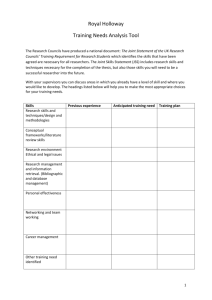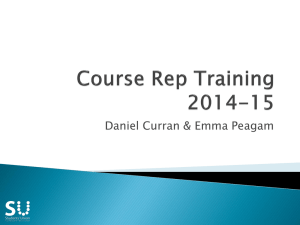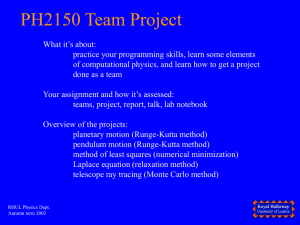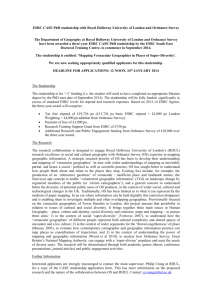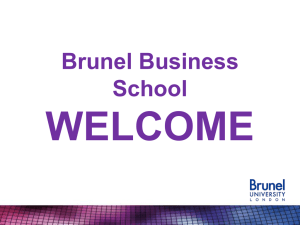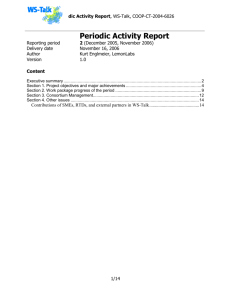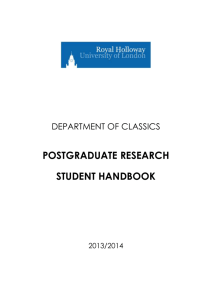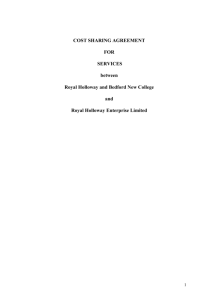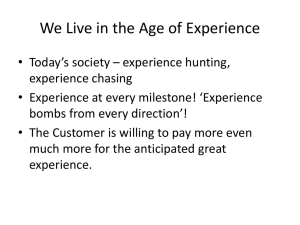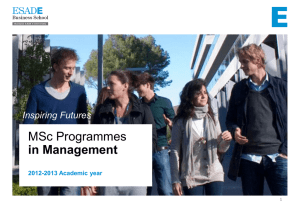MSc International Management Royal Holloway, University of London
advertisement
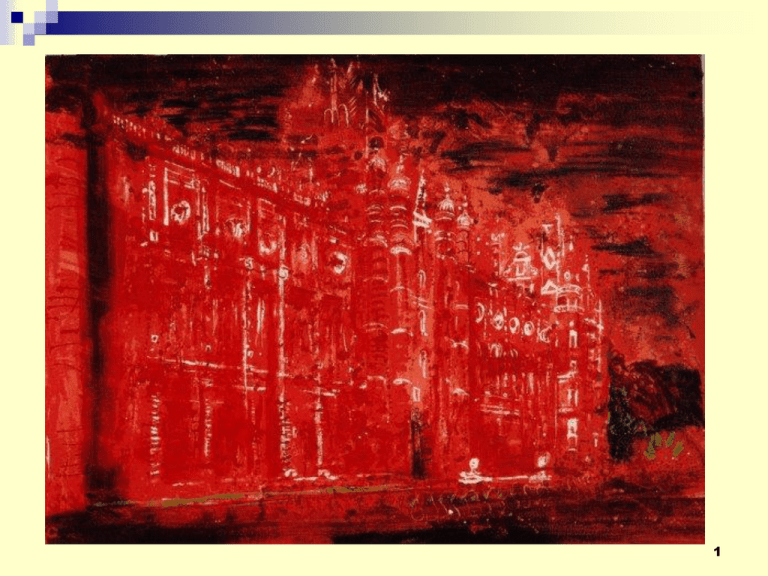
1 School of Management MSc International Management Induction 2012/13 (Seventh Cohort) Dr Derrick Chong, Programme Director Mrs Helen McEwan, Administrator 2 Who is Here? Name What/Where (since September 2012) Why (MSc IM at RHUL) Interests 3 ‘The Working Language is English’ Arabic Chinese French Portuguese Russian Spanish ‘To the friendship of English Speaking Peoples’ (BBC Bush House) 4 September 2013 Where do you want to be? What do you want to be doing? 5 There is a requirement to manage your own personal development alongside completing a rigorous academic programme of study RHUL Clubs & Societies RHUL Gym RHUL Career Services Other University of London 6 Hunt for a job and/or summer internship Start in Term 1 to be considered by large companies Consider opportunities outside home country 7 Purposes of Induction Session MSc International Management at RHUL Learning Process and Management Education Resources in Management Education 8 Drinks Reception Today almost now Moore Building (School of Management) 9 MSc International Management at RHUL 10 RHUL – School of Management Postgraduate Taught (PGT) Programmes General Management (2) MSc International Management MBA International Management Specialist Management (8) MA: Asia Pacific Business; Marketing MSc: Business Information Systems; Entrepreneurship; International Accounting; International HRM; Leadership and Management in Health; Sustainability and Management 11 MSc International Management at RHUL Taught postgraduate qualification in International Management from a research-led College of the University of London ‘Pre-experience’ (0-2yrs of f/t work experience) Ideally suited did not read management as part of an undergraduate (first) degree Knowledge of general management functions and transferable, soft skills Aged 21-25yrs from 20-odd nations AMBA-accredited MBM (redesign commended in 2010) 12 Some of the Faculty 13 Time Management is Essential 15hrs of class (lectures/workshops) per week Classes Mon-Fri (9.00-18.00) 12 months, full-time Teaching Term 1: 24 Sep – 14 Dec 2012 Teaching Term 2: 7 Jan – 22 Mar 2013 Exams (6 @ 2hrs): 29 Apr – 14 Jun 2013 Independent Research Paper due early Sep 2013 14 Programme Design Six General Management Functions Business corporation as social organization with multiple – often conflicting – stakeholders to satisfy Two Electives (with MBAs; selections made in Oct) Research Projects (group-based) Professional Business Skills (personal development and soft skills) Business Research Methods Independent Research Paper 15 Programme Weighting Courses Overall Weighting (%) Six General Management Functions (6.0 X 9.52% each) 57.14 Two Electives (2.0 X 9.52% each) 19.05 Research Projects 09.52 1.0 X 9.52% (= 2.0 X 4.76% per term) Professional Business Skills 00.00 Business Research Methods 00.00 Independent Research Paper (1.5 X 9.52%) 14.29 16 Assessment – individual (including exams, in-class tests, and Independent Research Paper) and group-based Six Core Management Courses Research Projects Personal development Business Research Methods Individual assignment or in-class test or group-based project (100%) Professional Business Skills Two group-based projects (50% each) Two Elective Courses Individual assignment (20%) + 2hr exam (80%); or In-class test (20%) + 2hr exam (80%) Supports Independent Research Paper Independent Research Paper 8-10,000 words (100%) 17 Learning Process and Management Education 18 Learning Process in Management Attendance Preparation Participation Pleasure 19 Attendance and Preparation Attendance is required for all classes (lectures and workshops) Monitored by the College and UK’s Border Agency Do not sign attendance sheets for ‘friends’ Do not pursue social-entertainment activities in class Preparation before classes Essential for both lectures (to understand what is being presented) and workshops (to facilitate discussions) 20 Participation for Skills Development Peer-based discussions facilitated by lecturers Transferable skills (in addition to subject knowledge) Learning to learn Self-awareness, openness, and sensitivity to diversity Interpersonal skills of effective listening, negotiating, and persuasion 21 Working in ‘Peer-Based’ Groups Process and Output Peer-based groups Not direct management authority Cooperative effort is essential Organizations and teams Cooperation around a common goal How to manage differences of opinion, effort? Diversity in organizations is deemed good Ad-hoc nature of project-based teams ‘Self and Peer Assessment’ document to be completed Support and guidance of course instructors 22 Working in Groups Some Suggestions Who are your group members? What and how do you communicate or behave? How is it perceived by other group members? Adopt English as common language Do not spilt the task in a piecemeal manner Independent thinking in advance of group meetings Individual responsibility to the group Maintain contact outside of scheduled meetings 23 Forms of Assessment and Feedback Assessment Diagnostic Examples Feedback • Induction Week Task (RHI) • Formative • Preparing workshop exercises/readings • Participation in lectures/workshops • Dissertation synopsis • Summative • Exams • Coursework (essays, presentations, etc) • Individual recommendations Oral and written feedback by lecturers • Views of peers in workshops or projectbased coursework Mark (on transcript) 24 MSc International Management Student-Staff Committee (chaired by the Director of Graduate Studies) Representatives (2 per stream) Self-Nomination (by email to d.chong@rhul.ac.uk by Sun 7 Oct) 100-150 words for circulation to peers Elections on Wed 10 Oct 25 Resources in Management Education 26 Listening The Spoken Word BBC Radio 4 (92.4-94.6) See www.bbc.co.uk for accompanying material 27 Reading International Business Press The Economist (part of Pearson which includes the FT) Financial Times See www.ft.com under ‘Business Education’ for MBA Gym (or www.mbagym.com for direct access) Bloomberg Businessweek (formerly Business Week) Forbes (Forbes Rich List) Fortune (Fortune 500; Time Warner) Wall Street Journal (News Corp) 28 Reading Databases of Management Journals See College’s library portal: http://eresources.rhul.ac.uk/kb/Management Business Source Complete (RHUL) ABI Inform (Senate House) Harvard Business Review, McKinsey Quarterly, California Management Review, Sloan Management Review, and Journal of Management Studies are general management journals Course lecturers will direct you to subject-specific management journals 29 Research Resources Handbooks for Management Boris Blumberg, Donald Cooper, and Pamela Schindler, Business Research Methods, 3rd European ed. (McGraw-Hill, 2011) Alan Bryman and Emma Bell, Business Research Methods, 3rd ed. (OUP, 2011) John Creswell, Research Design, 3rd ed. (Sage, 2009) Mark Saunders, Philip Lewis, and Adrian Thornhill, Research Methods for Business Students, 6th ed. (FT/Prentice Hall, 2012) 30 Research Resources Citation & Academic Referencing APA Style (which includes the so-called ‘Harvard’ citation system) http://apastyle.apa.org/learn/tutorials/basicstutorial.aspx Purdue University has an excellent and free resource, OWL (online writing lab), with a summary of citation styles http://owl.english.purdue.edu/owl/section/2/ 31 Purpose of Resources ‘Informed Opinion’ is Important Avoid Plagiarism Preparation for IRP 32 ‘Informed Opinion’ is Important Course lecturers are keen on your assessment/interpretation Analysis matters – go beyond description Course lecturers will expect that your opinion is informed 33 Avoid Plagiarism Plagiarize = ‘take and use another person’s thoughts, writings, or investigations as one’s own’ (COD) plagiarism and plagiarist Academic misconduct (crime of intellectual theft) Penalties include expulsion and material impact on degree Deception / carelessness / ignorance of correct practice 34 Independent Research Paper Final assessment (8-10,000 words) IRP requires planning and time management (more than a long version of an essay) 35 Final Thoughts Management at RHUL and You Intellectual Rigour Personal Development Social Capital (Networks) 36

